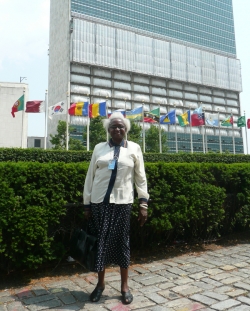 The High Level Meeting closed on Friday, so now it is time to reflect. The last few days have been a mixture of highs and lows.
The High Level Meeting closed on Friday, so now it is time to reflect. The last few days have been a mixture of highs and lows.
On Thursday, we were hugely disappointed to hear that the language relating to living long term with HIV and disorders associated with ageing was unlikely to be reinstated in the outcome document.
A glimmer of hope
Having shared our disappointment with the UK delegation, we were pleased to hear Stephen O’Brien (DFID Parliamentary Under Secretary of State) make reference to the challenges of ageing with HIV in the UK’s report to the UN in the General Assembly Hall.
He said: “Treatment has transformed the outlook for people with HIV and today many people are living near normal lives…But challenges remain including the need to diagnose early, deal with the challenges of ageing with HIV and reducing stigma. We need to guard against complacency”.
We were very encouraged to hear DFID recognising and raising this as an issue to be addressed in future.
Looking at the importance of care and support
On Friday, we started the day with the official side event organised by the Caregivers Action Network (co-founded and facilitated by HelpAge), the care and support working group of the UK Consortium on AIDS and International Development (co-chaired by HelpAge) and the Worldwide Palliative Care Alliance.
The side event looked at why universal access to prevention and treatment is impossible without care and support. The event was co-hosted by the government of Kenya, the Japanese mission to the UN, UNDP (United Nations Development Programme), UNICEF and UN Women.
A moving speech by an amazing grandmother
Kufekisa, or “Kay”, our amazing grandmother carer, was the first speaker at the event. She gave an incredibly moving and emotional personal account of how her family has been affected by HIV and the role she plays in the response to the epidemic as an older carer.
Many of our participants were visibly moved by Kay’s speech, including our second speaker Agnes, who was reminded of her own grandmother who cared for her when she was diagnosed with HIV, before ART (antiretroviral therapy) was available.
Following Kay and Agnes’ personal testimonies, we had presentations from Professor Alloys Orago, the Director of the NACC (National AIDS Control Council) in Kenya and a great friend to HelpAge, as well as Masaki Inaba from the Global Health Programme, Africa Japan Forum, who talked about living in to old age with HIV.
The event was a great success, with our three UN co-hosts recognising the neglect of care and support and the need to do more.
Failure to recognise ageing of the epidemic
Friday ended with the closing session of the High Level Meeting at which the outcome declaration – the Political Declaration on HIV and AIDS – was adopted by all member states.
After long and difficult negotiations the declaration makes a number of important commitments including re-committing to Universal Access, pledging to achieve 15 million people on ART by 2015 and a commitment to eliminate mother-to-child HIV transmission.
All are crucial to a successful response to HIV and member states should be praised for their commitments. However, as feared the declaration did not include any language specifically referring to the needs of older people and text on disorders associated with ageing was not reinstated.
This is hugely disappointing and shortsighted on the part of member states. The declaration will frame the future of the HIV response yet it fails to recognise an emerging trend – the ageing of the epidemic.
Frustrated but committed
So, after nearly two weeks in New York I left feeling frustrated with the process and the outcome and with the question of when the world will sit up and take notice of older people still very much unanswered.
However, having spent this time with Kufekisa, talking about her and her family’s experiences and hearing her speak with so much passion and commitment, I also come home knowing that HelpAge will continue to work hard with people like her, to support her in her efforts to address HIV and the impact it has on older people.
What next?
- See what HelpAge is doing to help alleviate the impact of HIV and AIDs on older people and their families by exploring our interactive HIV project scrapbook.
- This year is the 30th anniversary of AIDS. View our photogallery to read older people’s memories of the early days of the disease.
